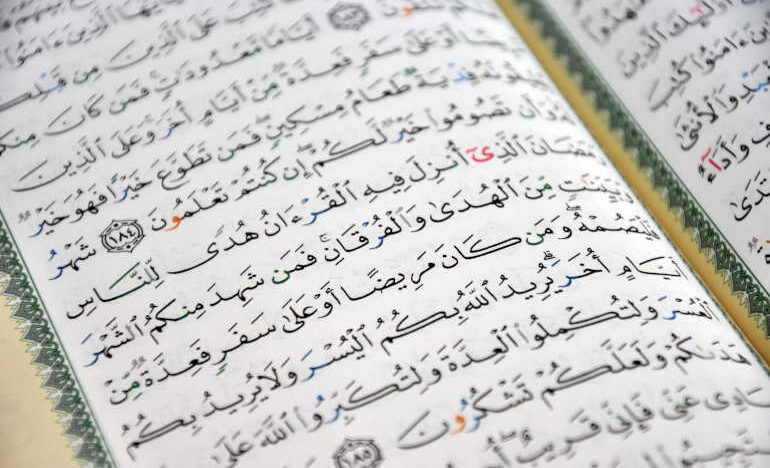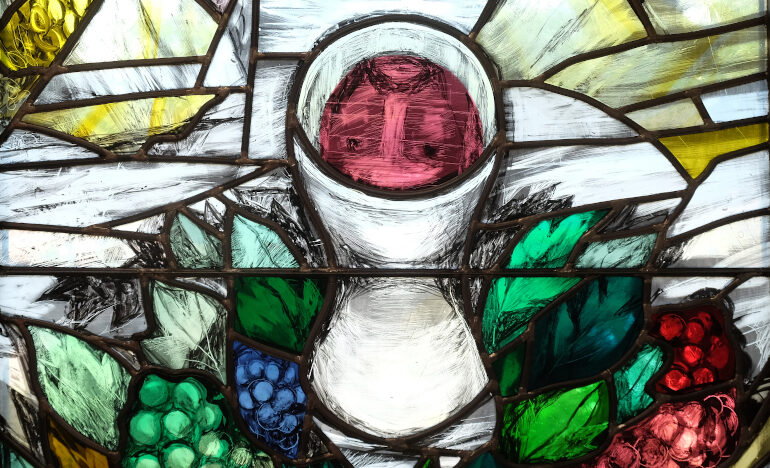Fasting and Pilgrimage: The Final Pillars of Islam

By Kathy Keary
Part 18. The full series is here: The Contemplative Spirit of Islam.
The Fourth Pillar of Islam — Fasting
The Night of Power occurred during the ninth month of Islam’s lunar calendar. As you may recall, this is when the Angel Gabriel began transmitting the Qur’ān to Muhammad. Ramadan takes place in this ninth month of the Islamic calendar. During this month-long period, Muslims refrain from food, drink and intimate relations from dawn to dusk.
This challenging tradition is so important to Muslims that adherence to this practice is the fourth pillar of Islam.
If a Muslim is unable to fast for health reasons or difficult circumstances, then that individual is required to feed a hungry person if they can do so (Out of Darkness, 177).
Self-purification is key to fulfilling this observance. This timeframe is marked by a renewed dedication to boosting one’s self-restraint to promote a guard against moral and spiritual shortcomings.
The Prophet Muhammad describes this ritual as when “the gates of paradise are open, the gates of hell are closed, and the devils are in chains.”
Muhammad instructed his followers to approach Ramadan with serious intent to “cultivate in one’s self the attributes of God” (Fragrance, 132). Jamal Rahman asserts:
The purpose of the fast is to remind us to dedicate ourselves to the taming of the petty impulses and negative patterns of the ego so that we may evolve in compassion, awareness, and righteous deeds. Thus, by disciplining our bodies we nourish our souls. In the imagery of our friend Rumi, the body is like a flute. If the soundbox is stuffed, there can be no music (Out of Darkness, 177).
The 27th night of Ramadan is known as the Night of Power. Special attention is paid to prayer. It is believed on this special night that Allah gives the angels and Spirits special permission to come down and join in this holy worship.
Each evening an iftar dinner takes place at sunset which is the breaking of the fast. Muhammad described this traditional meal as one of the joys of fasting giving Muslims a taste of paradise. (The last few years, the Renewal Center has joined our Muslim brothers and sisters from the Dialogue Institute of Kansas City for an iftar, which includes prayer, a meal and a talk about Islam.)
The second joy of fasting is known as Īd, a holiday that follows the appearance of the new moon that marks the end of Ramadan. Rahman describes this special celebration as a “foretaste of the breathless joy and delight felt in glimpsing God’s face on the Day of Judgement” (Fragrance, 133).
The image above shows “ayah,” or verses from the Qur’ān that talk about Ramadan. (Credit: Photo 15601451 / Fasting © Mohamed Osama | Dreamstime.com.)
The Fifth Pillar of Islam — Pilgrimage
We will now turn our focus to the fifth and final Pillar of Islam known as Hajj. The word, “Hajj,” means to set out with a definite purpose. The Qur’ān instructs every Muslim who is physically and financially able to journey to the holy city of Mecca to participate in the rituals of Hajj. This six-day sacred journey takes place during the 12th month of the Islamic calendar. The pilgrimage includes rituals to honor the Prophet Muhammad and Abraham. By participating in Hajj, one demonstrates their love of God (Fragrance, 134).
The ceremony includes circling the sacred Kabah multiple times. This is the building at the center of Islam’s most revered mosque considered the holiest site in Islam. It is believed that invisible heavenly beings join in the worship of God. The walk symbolizes the individual’s desire to draw close to Allah.
Note: Never miss an article published on the Renewal Center website: Sign up to receive our newsletters.
The tradition also involves visiting the Plain of Arafat where God made his primordial covenant with humanity. The site is also known to be the place where Adam and Eve were reunited on earth after their fall from grace. In this holy site, Muslims pray for forgiveness for themselves and others.
Hajj also includes a trip to Minā, the place where Abraham, Hagar, and Ishmael resisted temptation. Muslims throw stones at a wall to symbolize their resolve to resist the wiles of the devil.
The ritual includes sacrificing an animal and distributing the meat to those living in poverty. This act symbolizes sacrificing one’s ego at the altar of God. The final act is to circle the Kabah once again as the participants call to mind that their real homeland is in the celestial realm.
Notably, men and women wear the same white clothing, with the color representing purity and truth. Wearing the same clothing unifies the group as one people joined together to express their love of God. Muhammad preached the importance of community which this pilgrimage exemplifies (Fragrance, 135).
We invite you to stay tuned for our next article where we will explore the Islamic view of death and the hereafter.
References
Rahman, Jamal; Elias, Kathleen Schmitt; and Redding, Ann Holmes. Out of Darkness Into Light: Spiritual Guidance in the Quran with Reflections from Christian and Jewish Sources. Harrisburg, New York: Morehouse Publishing, 2009.
Rahman, Jamal. The Fragrance of Faith: The Enlightened Heart of Islam. Bath, England: The Book Foundation, 2004.
[Kathy Keary, a Precious Blood Companion and spiritual director, holds a master’s degree in theological studies and is a graduate of the Atchison Benedictine’s Sophia Center’s Souljourners Program, an intense study of spirituality and spiritual direction. Kathy believes that the divine is present and active in all of life and encourages others to be awakened to the God in all including the divine within. She enjoys accompanying others on their journey to wholeness discovering the person they were created to be.]
We’d Like to Hear from You!
We’d like to know what you think about this article. Send us a comment using the form below. Do you have a suggestion? Is there something you want to learn more about? Send us a note.
Related

Argue, Debate, or Be Constructive?
An Assembling God’s Puzzle video
By Fr. Garry Richmeier
It seems to be part of our DNA to sort everything in life into two categories — right or wrong, good or bad. Of course, we are always on the “right” side and to demonstrate our “rightness” we demonize the other side and problems ensue. How can we break the cycle?

6th Reflection on Eucharistic Prayers: We become whom we receive
By Fr. Ron Will, CPPS
I hope that my reflections make you more attentive to the Eucharistic Prayer at the next Mass you attend. When you really listen to the readings and the prayers, the pieces of the puzzle of the Mass come together and you see the incredible vision God has for us.
